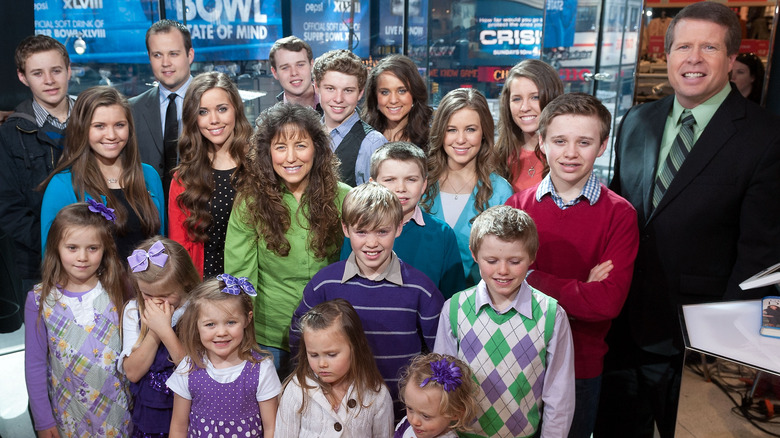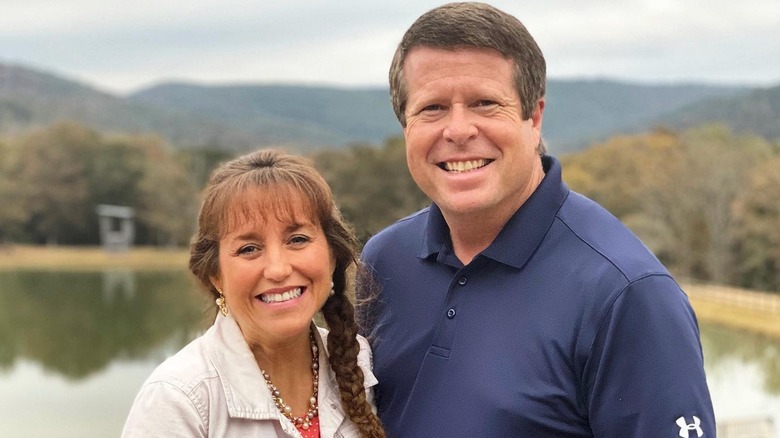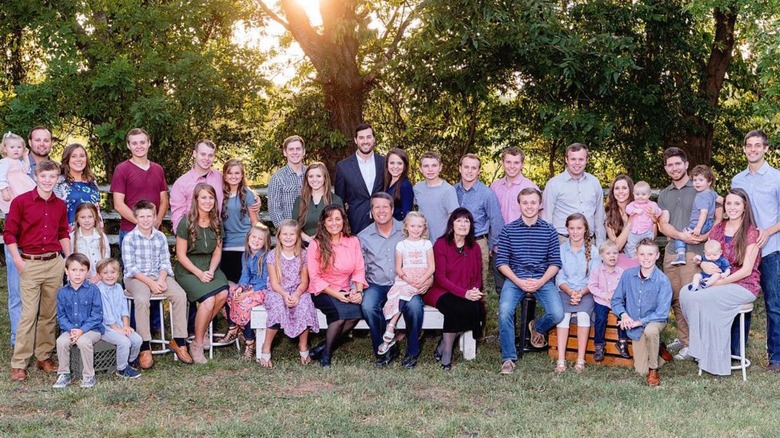Shiny Happy People: Duggar Family Secrets Directors On Their New Docuseries - Exclusive Interview
This interview contains discussion of spiritual abuse.
In their docuseries "Shiny Happy People: Duggar Family Secrets," producer-directors Julia Willoughby Nason and Olivia Crist aren't holding back when it comes to exposing the repressive value systems behind "19 Kids and Counting" and other media depicting an idealized version of the American family. Viewers watched the Duggar family grow on TV from 2008 to 2015 in a show originally called "17 Kids and Counting" that adjusted for new additions to the family in their "19 Kids" title. From 2015 to 2021, a spin-off series, "Counting On," depicted the family's elder daughters, Jill and Jessa Duggar, as they settled into adult life and started their own families.
However, interviews from inside the new docuseries — including Jill Duggar Dillard telling her own truth about the Duggars' reality TV franchise — unmask the picture of happy growing families and trusted parents. They unpack the ideology Jim Bob and Michelle Duggar inherited from the Institute in Basic Life Principles, a religious organization that promotes patriarchal and authoritarian values that inflict long-term damage on those involved. This series goes beyond what the Duggar family thinks about gender roles or their eldest son's legal battles and alleged history of abuse. In their exclusive interview with The List, producer-directors Julia Willoughby Nason and Olivia Crist shared how they went "down the rabbit hole" to uncover the truth behind the Duggars' shiny, happy family and the deeper issues their story represents.
The producers wanted to expose a powerful organization
It's great to connect with you guys. I watched the series, and it's really powerful.
Olivia Crist: Thank you.
Julia, You've been part of documenting an incredible range of stories, from the Fyre Festival to the Murdaugh Murders to a series on Trayvon Martin. What led you to pursue the kind of story that you tell in "Shiny Happy People: Duggar Family Secrets"?
Julia Willoughby Nason: Thank you so much. "Shiny Happy People" struck a chord with me because it is investigating a veneer of happiness and idealism of the American dream and seeing what's underneath that, which goes to the core of all of my work in terms of understanding systems of abuse and the enablers surrounding that.
Olivia, what drew you to this project?
Crist: For this one in particular, the Duggars are a jumping-off point to the larger story here, which is the IBLP — the Institute in Basic Life Principles, which was founded by a man named Bill Gothard — and exposing the abuse and the abusive practices that are happening within this cult. While you might know the Duggars from their time on television, the story reveals that what you don't know is what was lying beneath the surface of this shiny, happy veneer.
Absolutely. If either of you were to summarize the IBLP for someone trying to understand the institution as a whole, what would you say?
Crist: It boils down to this principle of authority and authoritarianism. In the Institute in Basic Life Principles and through their homeschooling program, ATI [Advanced Training Institute] ... Lots of acronyms here; that's classic cult. But it boils down to the men in the family and the men in leadership having ultimate and absolute authority, and the women and children submitting to that authority. When you have a structure like that, it's rife with abuse.
After seeing more people speaking out about their experiences with the IBLP, does it seem like other members of the Duggar family might ever talk about their upbringing? I know you had some family members in the docuseries.
Willoughby Nason: I would hope so. I would hope that this would encourage people — all people — who feel oppressed and feel isolated and seemingly not having a voice to practice using their voice as a way to continue to shed light on these authoritarian, patriarchal systems.
Crist: It's key here that there is a large community. There is a way out. That's the hopeful message that we end the series with — there's a community that will catch you if you want to get out of this cult or get out of an abusive system like it.
The reality show was grounded in patriarchal beliefs
Some of the moments that stuck with me in the series were hearing about repressed sexual feelings that can lead to more issues down the road, as well as "learning slut-shaming instead of math" in the IBLP programming. How did you work through the layers of indoctrination and misinformation that you encountered throughout these many interviews?
Willoughby Nason: As filmmakers, we're the conduits to absorb these people's perspectives and hold them and honor their courage to come forward. The way we went through all the layers of the abuse and gaslighting was to catch these people as they were telling it and then curate it down to the essence. A lot of the themes came back to authoritarianism and patriarchy. Everything circled back to this one route. All of these examples, like you said, come from the same core, essentially.
Crist: Telling a story like this, it's almost a down-the-rabbit-hole approach. You have the kooky teachings — "the Cabbage Patch Dolls are possessed by demons" and all of these crazy things. Then you go deeper down the rabbit hole, and you get to the darker elements like corporal punishment, and what you already mentioned here is this repressed sexuality and the strict modesty standards that all these women had to follow. The deeper you dive, the more rotten it gets. Like Julia said, it all circles back to this theme of authoritarianism and the men having absolute control.
The series also says, or someone in an interview says, that reality TV has the capacity to promote a lot of conservative value systems, especially from a gender perspective and from hierarchies of power. When do you feel like that became the most apparent to you in your research or your interviews, that reality TV itself was a platform for this?
Willoughby Nason: Inherently, reality TV cannot live in any sort of nuance because of the product and the machine that it's promoting — so inherently, it's going to lean into stereotypes and conventionalism to set a Disney-like fairytale with adults.
Crist: We were very fortunate to have some great commentary on the show on that ... It's hard to get into the weeds like you would with a documentary. In reality television and in general, it's reality, but it's not. At the same time, there's invented storylines, and I'm sure each production is different. Speaking specifically to the Duggar show, you see the IBLP principles on the show. All the women dressed very modestly. These messages are coming through. They might not always be overt, but they're very much there. Rewatching the show and including clips of that in our series is really to take a different lens of how we are viewing and ingesting this content.
If you or anyone you know has been a victim of sexual assault, help is available. Visit the Rape, Abuse & Incest National Network website or contact RAINN's National Helpline at 1-800-656-HOPE (4673).
The IBLP's values are insidious in American culture
Did both of you have to watch the show back and pick up on different themes? How much research did you do in that sense?
Crist: A lot of hours. A lot of TV.
What was it like reviewing the material on the Christian influencers on YouTube and social media? Was that anything you had encountered before this project?
Crist: One of the interesting things for us was [that] you have this family on TV, and then you have this cult behind the family, IBLP. But all of these tenets and principles that IBLP promoted have seeped [into] the fabric of American culture. There's politicians involved with IBLP, the police, the military. You might not recognize it as an IBLP principle or as a certain adjacent ideology, but it's really embedded into the culture. Social media is part and parcel with that.
Willoughby Nason: Exactly. Reviewing the Christian social media through research on this project ... While I hadn't on my own sought that out except [while] working on this project, a lot of the social media in the Christian influencer realm reminded me of all of our social media. There's such a cloak around the posturing in social media that the deeper, underlying messages behind what people say are sometimes hard to differentiate. It was familiar in a strange way.
Any last thoughts for those trying to move away from these paternalistic institutions or breaking away from a conservative religious background?
Crist: Most importantly — and our survivors speak to it eloquently in the show — is that there is a way out, and there are communities out there that will catch you when you come out of this movement. A lot of times, because these people have been so isolated and educationally neglected and all of these things, it can feel very lonely and hopeless. I'm hoping our show shows the opposite of that because there is — not to be cliché — but there is light at the end of the tunnel, and there is a way out of this.
If you or someone you know is dealing with spiritual abuse, you can call the National Domestic Violence Hotline at 1−800−799−7233. You can also find more information, resources, and support at their website.
"Shiny Happy People: Duggar Family Secrets" premieres June 2 on Prime Video.
This interview has been edited for clarity.


